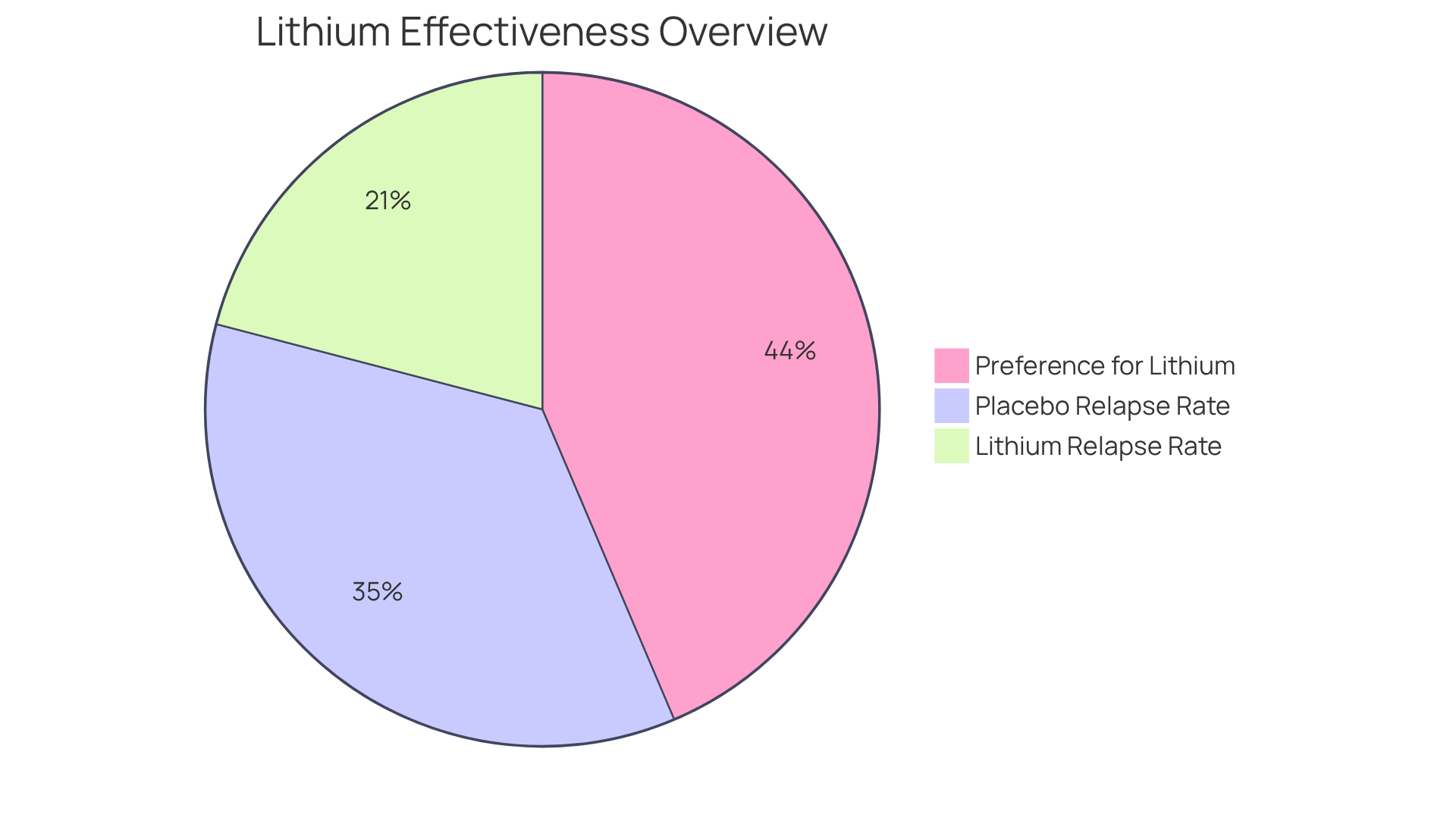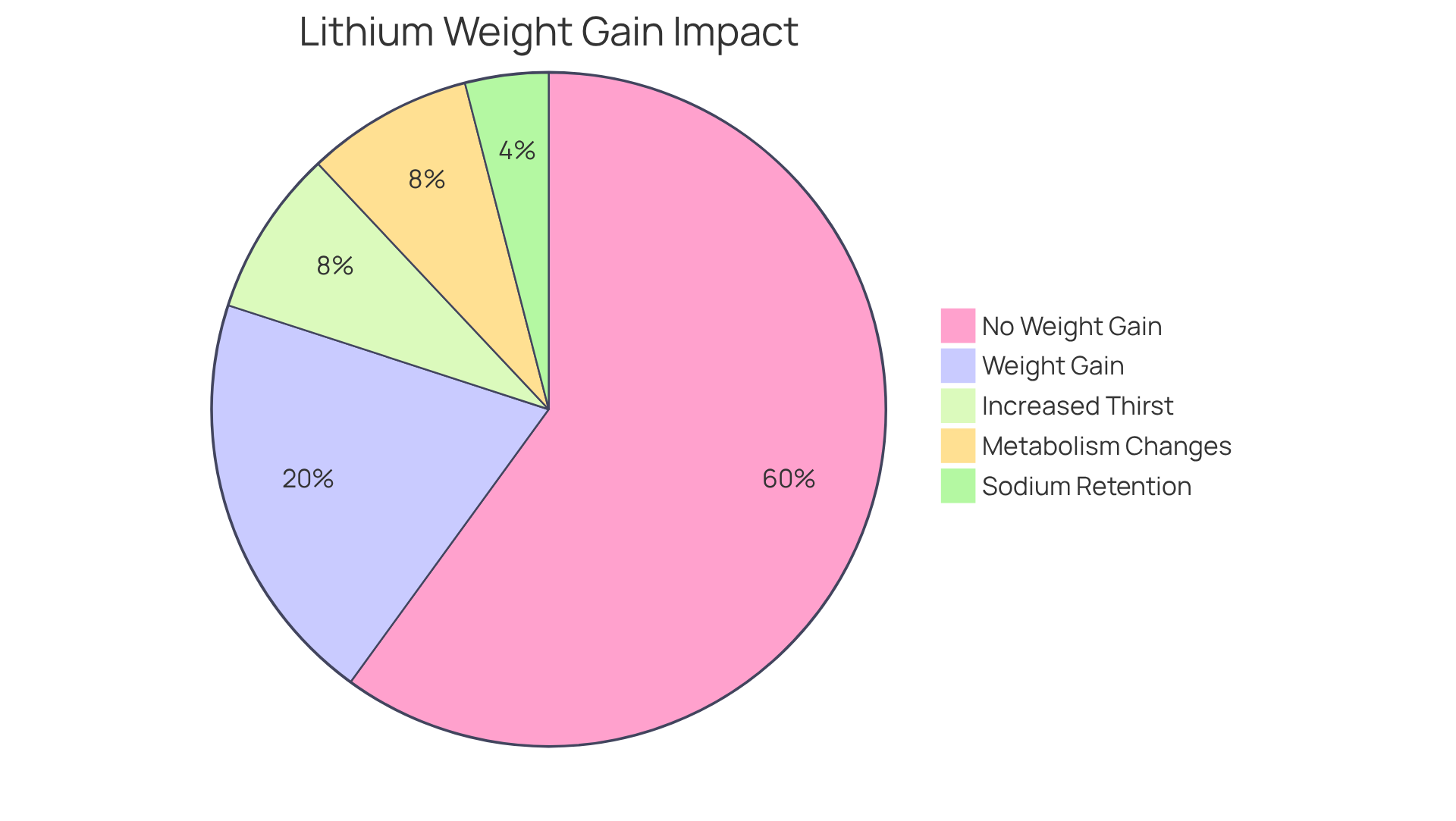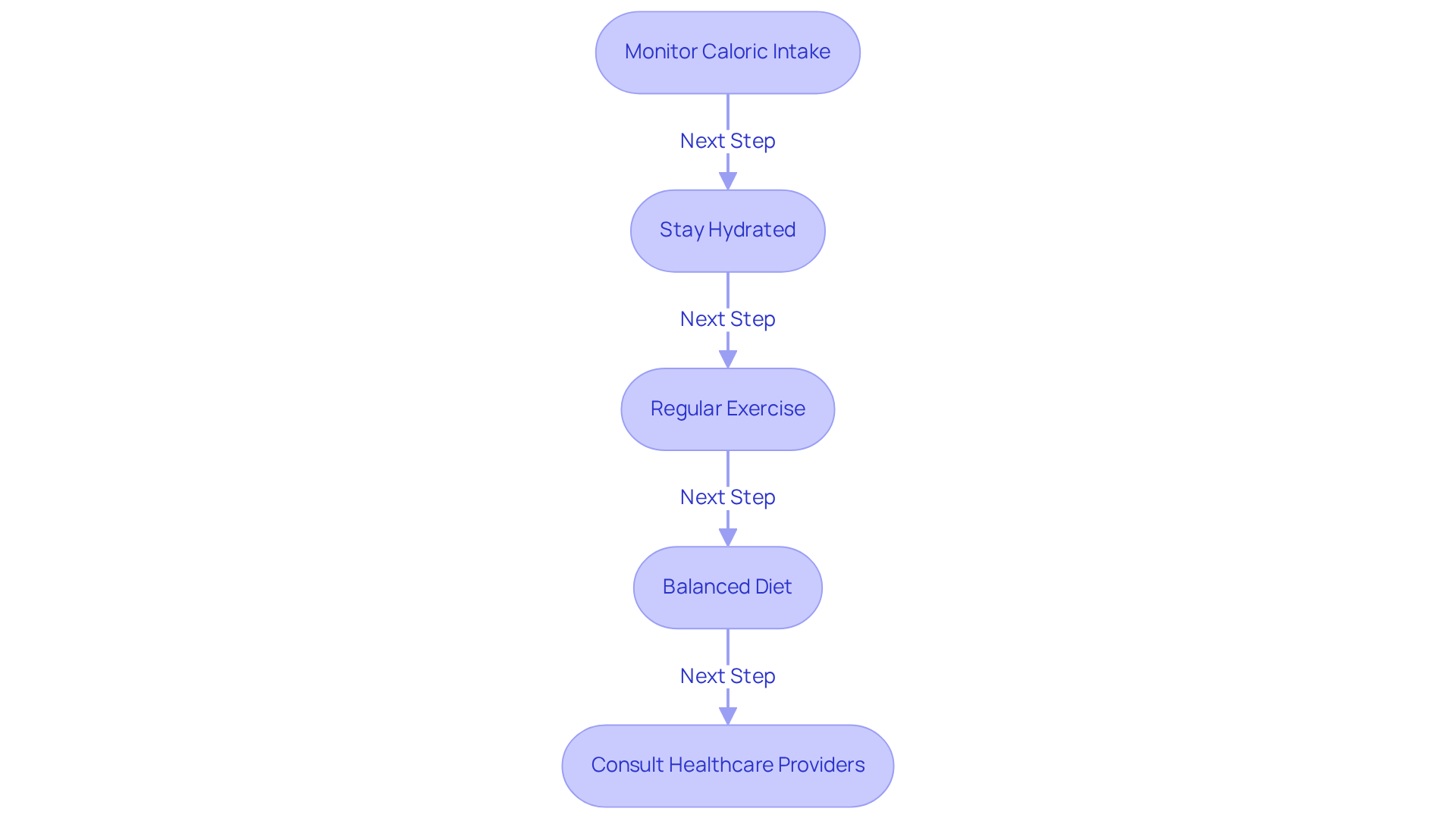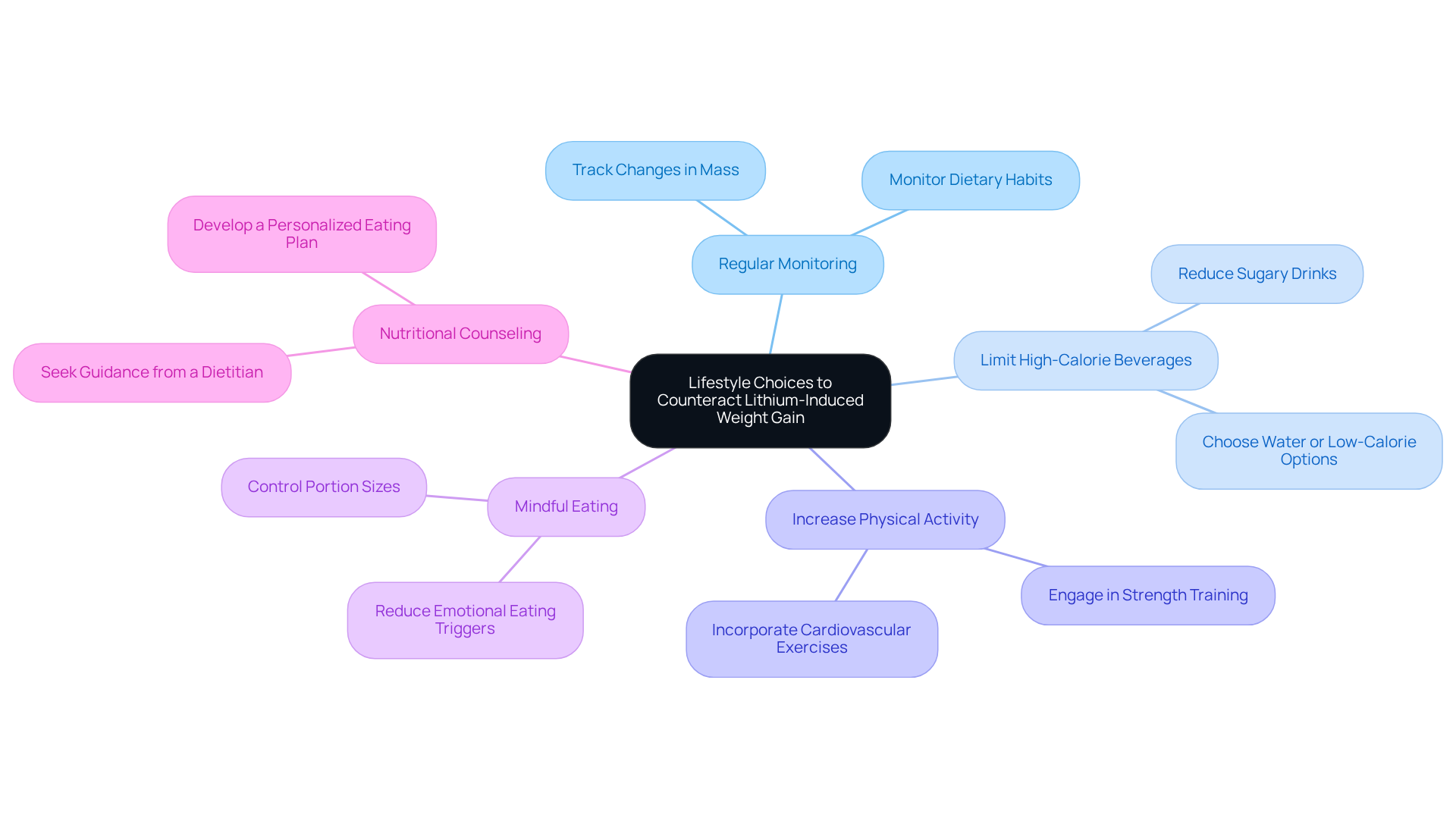Does Lithium Make You Gain Weight? Understanding the Impact
Overview
Lithium can lead to weight gain in approximately 25% of users. This occurs due to several factors, including increased thirst, caloric consumption from sugary drinks, and metabolic changes. Furthermore, these mechanisms contribute to an average weight increase of 10 to 26 pounds within the first one to two years of treatment. As a result, it is crucial to manage diet and lifestyle effectively to mitigate this side effect. By being aware of these factors, individuals can take proactive steps to maintain a healthy weight during treatment.
Introduction
Lithium has long been recognized as a fundamental treatment for bipolar disorder, celebrated for its mood-stabilizing effects and neuroprotective properties. However, the question of whether lithium contributes to weight gain looms large for many users. Studies suggest that around 25% may experience significant increases in body mass. This article delves into the intricate relationship between lithium treatment and weight management, exploring the mechanisms behind potential weight gain and offering practical strategies for those seeking to maintain a healthy lifestyle while benefiting from this essential medication.
What can individuals do to navigate the complexities of weight changes associated with lithium? How can they effectively manage these challenges? By understanding these dynamics, readers can better equip themselves to handle the potential side effects of this important treatment.
Explore Lithium: Uses and Mechanisms in Mood Stabilization
Lithium is a cornerstone in the treatment of bipolar disorder, primarily acting as a mood stabilizer. Its effectiveness arises from its ability to modulate neurotransmitter levels in the brain. Specifically, lithium inhibits inositol monophosphatase, an enzyme essential to the phosphoinositide signaling pathway. This inhibition stabilizes mood and effectively prevents manic episodes, making lithium a vital component of bipolar disorder management.
Furthermore, lithium exhibits neuroprotective properties, enhancing its long-term effectiveness in mood stabilization. Recent studies indicate that lithium significantly lowers the risk of relapse, with a relapse rate of 36% compared to 61% for placebo over one year. This statistic emphasizes lithium’s essential role in preserving mental health. Additionally, over 75% of participants consider alkali metal salts as the preferred option for the maintenance phase of bipolar disorder, reinforcing its established role in care.
The absolute risk reduction of 25% when comparing lithium to placebo further underscores its clinical impact. Understanding these mechanisms is crucial for patients and caregivers, as it highlights the therapeutic advantages, potential side effects associated with this treatment, and specifically addresses whether does lithium make you gain weight. By grasping how lithium works, individuals can make informed decisions about their mental health management.

Examine the Connection: How Lithium Influences Weight Gain
Studies indicate that this substance raises the concern of whether lithium does make you gain weight for certain individuals. Estimates suggest that approximately 25% of users experience a swift mass increase from using this mood stabilizer, leading to the question, does lithium make you gain weight, as reported by The PsychPlus Team. The mechanisms behind this mass increase include heightened thirst, which can lead to greater caloric consumption through sugary drinks, and changes in metabolism that raise the question of whether lithium does make you gain weight by promoting fat accumulation. Furthermore, sodium and water retention can occur, which raises the question: does lithium make you gain weight?
Understanding these connections is vital for patients aiming to manage their mass effectively during therapy, particularly in relation to whether lithium does make you gain weight. Typically, mass gain within the first 1 to 2 years of treatment raises the question: does lithium make you gain weight, with an average increase ranging from 10 to 26 pounds. To mitigate these effects, it is advisable to limit the intake of high-calorie foods and beverages. This approach allows individuals to maintain a healthier lifestyle while reaping the mood-stabilizing benefits of the medication.

Implement Strategies: Managing Weight While Taking Lithium
To effectively manage weight while taking lithium, consider implementing the following strategies:
-
Monitor Caloric Intake: Keep a detailed record of your daily caloric consumption. Prioritize nutrient-dense foods over high-calorie snacks and sugary beverages. This method assists in reducing the risk of increased mass, raising the question of whether lithium does make you gain weight, which impacts roughly 25% of people receiving treatment with lithium. An initial increase in mass may also indicate recovering previously lost mass from manic episodes, which raises the question of whether lithium does make you gain weight, making it vital to comprehend these dynamics.
-
Stay Hydrated: Ensure adequate hydration by drinking plenty of water. This can help control heightened thirst, a frequent side effect of the medication, and lessen the urge to consume high-calorie beverages, which raises the question of whether lithium does make you gain weight. Be mindful that increased thirst may lead to higher calorie intake through sugary beverages.
-
Regular Exercise: Aim for at least 150 minutes of moderate exercise each week. Participating in physical activity not only aids in managing body mass but also improves overall health, which is essential for individuals undergoing medication therapy.
-
Balanced Diet: Emphasize a diet rich in whole foods, including fruits, vegetables, lean proteins, and whole grains. Restricting processed foods and added sugars can assist in sustaining a healthy body mass and enhance metabolic health, especially considering that hypothyroidism—a possible complication of prolonged lithium use—may lead to the question, does lithium make you gain weight?
-
Consult Healthcare Providers: Regularly engage with healthcare professionals to discuss personalized health management strategies. This partnership can assist in customizing dietary and exercise strategies to meet personal requirements, ensuring effective management of both bipolar disorder and health issues. Additionally, consulting a dietitian may provide valuable insights into managing diet and caloric intake while on lithium.

Monitor and Adjust: Lifestyle Choices to Counteract Lithium-Induced Weight Gain
To effectively counteract lithium-induced weight gain, consider implementing the following lifestyle adjustments:
-
Regular Monitoring: Consistently track changes in mass and dietary habits to identify patterns and make necessary adjustments. Research shows that 20% to 50% of lithium users will increase mass, leading to the concern of whether lithium does make you gain weight, which makes this proactive method essential for patients undergoing lithium treatment.
-
Limit High-Calorie Beverages: Reduce the intake of sugary drinks, which can significantly contribute to caloric excess. Increased fluid consumption might result in gaining mass, prompting the inquiry of whether does lithium make you gain weight due to the extra calories consumed. Choosing water or low-calorie options can assist in managing overall caloric consumption and aid in efforts for maintaining a healthy body.
-
Increase Physical Activity: Engage in regular physical activity, including strength training and cardiovascular exercises. This not only enhances metabolism but also assists in preserving muscle mass, which is essential for overall health and management of body composition.
-
Mindful Eating: Adopt mindful eating techniques to control portion sizes and reduce emotional eating triggers. About one-third of users of this medication experience heightened appetite as a side effect, which leads to the question of does lithium make you gain weight, making awareness of food choices crucial for healthier eating habits and preventing unnecessary gain.
-
Nutritional Counseling: Seek guidance from a registered dietitian or nutritionist to develop a personalized eating plan that aligns with your health goals while on medication. A dietitian can provide tailored strategies to navigate dietary challenges and promote healthier habits. As one nutritionist remarked, tracking body mass while on this medication is essential for effectively managing potential side effects.
By integrating these strategies, individuals on lithium can better manage their weight and enhance their overall health, which helps address the common question of does lithium make you gain weight associated with this treatment.

Conclusion
Understanding the impact of lithium on weight is crucial for individuals undergoing treatment for bipolar disorder. This article delves into the complexities of lithium as a mood stabilizer, highlighting its effectiveness in managing mood and preventing relapses while also addressing the common concern of weight gain associated with its use. By examining the mechanisms behind lithium’s influence on body weight, it becomes evident that while some individuals may experience weight gain, there are effective strategies to mitigate these effects.
Key insights reveal that approximately 25% of lithium users may face weight increases, primarily due to heightened thirst, changes in metabolism, and sodium and water retention. The article emphasizes the importance of:
- Monitoring caloric intake
- Maintaining hydration
- Engaging in regular exercise
- Adopting a balanced diet
to counteract potential weight gain. Furthermore, consulting healthcare professionals is vital for personalized management strategies, ensuring that individuals can navigate their treatment effectively while maintaining their health.
Ultimately, the significance of understanding how lithium affects weight cannot be overstated. By implementing mindful lifestyle changes and being proactive about health management, individuals can enjoy the therapeutic benefits of lithium while minimizing unwanted weight gain. This comprehensive approach not only supports mental health but also promotes overall well-being, empowering individuals to take charge of their treatment journey.
Frequently Asked Questions
What is lithium used for in mental health treatment?
Lithium is primarily used as a mood stabilizer in the treatment of bipolar disorder.
How does lithium work in the brain?
Lithium modulates neurotransmitter levels by inhibiting inositol monophosphatase, an enzyme crucial to the phosphoinositide signaling pathway, which helps stabilize mood and prevent manic episodes.
What are the long-term effects of lithium on mood stabilization?
Lithium exhibits neuroprotective properties that enhance its long-term effectiveness in mood stabilization and significantly lowers the risk of relapse in patients with bipolar disorder.
How does the relapse rate compare for patients on lithium versus those on a placebo?
The relapse rate for patients on lithium is 36%, compared to 61% for those on a placebo over one year.
What percentage of participants prefer lithium during the maintenance phase of bipolar disorder treatment?
Over 75% of participants consider alkali metal salts, like lithium, as the preferred option for the maintenance phase of bipolar disorder.
What is the absolute risk reduction of relapse when using lithium compared to a placebo?
The absolute risk reduction is 25% when comparing lithium to placebo.
Why is it important to understand how lithium works?
Understanding how lithium works is crucial for patients and caregivers as it highlights the therapeutic advantages, potential side effects, and helps in making informed decisions about mental health management.






